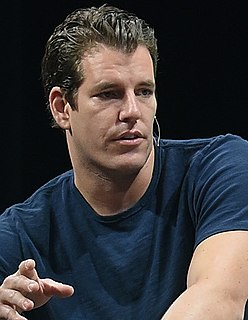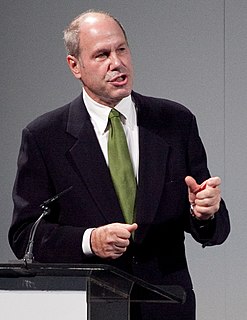A Quote by Aaron Patzer
Be careful not to start a company that really belongs as a feature of another company, like the 25 Twitter URL shortener companies out there. Pick a real problem that's here to stay.
Related Quotes
I think it's always interesting when you see a company start moving so quickly - it's like wow, incredible. When a company like Uber starts breaking away, it's not a linear thing. It's exponential. All of a sudden, the guy you know who threw $25,000 at Uber very early on - all the sudden, that $25,000 is $25 million.
Some years ago one oil company bought a fertilizer company, and every other major oil company practically ran out and bought a fertilizer company. And there was no more damned reason for all these oil companies to buy fertilizer companies, but they didn't know exactly what to do, and if Exxon was doing it, it was good enough for Mobil and vice versa.
The half-life of companies is shrinking. So in the same ease in which you can start a company today to disrupt an incumbent, you have to also realize that somebody will do that to you as well just as easily. So if you're not just going to get on top but stay on top, that will require a real prepared mind across many companies.
I did something rather innovative that my competitors didn't like: I took out a full-page advertisement in the Yellow Pages that listed an office on the east side of Cincinnati, and another office on the west side, while every other heating/air-conditioning company had only one location and one phone number. I was the citywide company. In fact, our 'westside office' was just an answering service taking telephone message. From the start we appeared to be a big company.
Basically my point of view on unicorns is that private companies which have sky high valuations, it doesn't really mean anything in the real world until it's marked to market. And there's only two ways things get marked to market in venture capital: Either a company is acquired by another company for cash or marketable security, or it goes public, and then it has reporting requirements and then the market will determine the value.
In Europe, we don't only take offence when one company is treating another company in a way that's illegal. We also look at if governments are joining up with companies that makes it more difficult for other companies. We also see that sometimes government actions can make it very difficult for businesses to compete on their merits.
Growth isn't central at all, because I'm trying to run this company as if it's going to be here a hundred years from now. And if you take where we are today and add 15% growth, like public companies need to have for their stock to stay up in value, I'd be a multi-trillion-dollar company in 40 years. Which is impossible, of course.

































